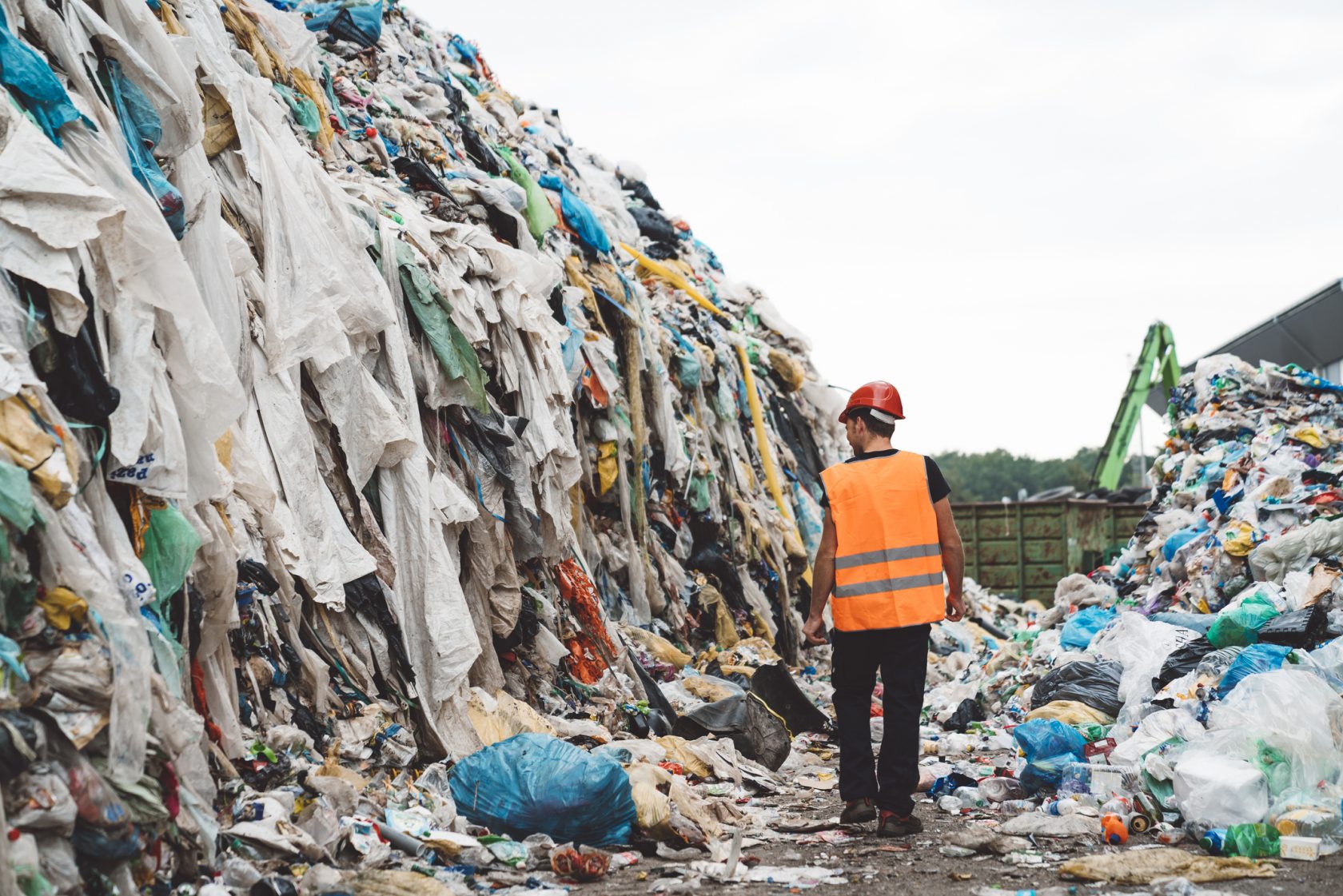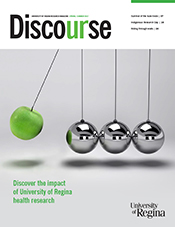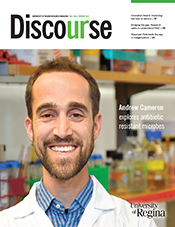U of R researcher receives federal funding to help curb textile and clothing waste.

Canadians throw out more than one million tonnes of clothing and textiles every year. Unlike paper and plastic, clothing is challenging to recycle because it often contains multiple materials, like blends of synthetic and natural fibres, plastic buttons, and metal zippers.
While the rise of fast fashion makes it easy to discard clothes and buy new ones, it also puts serious strain on Canada’s waste management system. University of Regina engineer Dr. Kelvin Tsun Wai Ng says Canada needs a viable engineering and business management framework to collect, process, and recycle clothing and textiles – helping to create a circular economy and cut down on how much ends up in our landfills.
To create an evidence–based policy and a comprehensive circular economy framework in the fashion industry, Ng received a $500,000 Discovery Grant from the Natural Sciences and Engineering Research Council (NSERC). Ng’s award was part of a larger national announcement where University of Regina researchers received $3,442,500 in total funding.
For his project, Ng and his collaborators will develop an interactive Canadian thrift-store database and create a machine-learning model on clothing and textile recycling behaviours.

“But there’s more than a framework needed. There are also socio-economic barriers that need to be addressed, including the social stigma of second-hand clothing, the low value that’s placed on the aesthetic appeal of used clothes, as well as how they’re perceived simply because they often cost a lot less than new clothing,” says Ng.
It’s these reasons, and more, that post-consumer clothing and textile waste involves a lot of different facets of society.
“To help solve these issues it’s imperative to look at how societal, environmental, cultural, health, and economic values are all interconnected in clothing and textile waste,” says Ng, who is a professor in the environmental systems engineering program.
The research team includes researchers from the University of Alberta, Toronto Metropolitan University, and Seneca College with combined expertise from many different areas, including engineering, textiles, human ecology, social and behavioral sciences, and business.
Ng says this project will have positive environmental and societal implications. “By better managing clothing and textiles domestically we can support a healthier circular economy. Doing this will reduce waste heading to our landfills, as well as the burden placed on countries who export second-hand clothing – ultimately reducing health risks to marginalized groups, and mitigating business ethical issues of waste importation/exportation.”
Ng says that once the research team has collected their data, their ultimate goal is to create a waste-management framework that will include recommendations and guidelines for policy-makers, improving environmental sustainability in Canada.
Dr. Chris Yost, University of Regina Vice-President (Research), says U of R researchers are making impactful contributions to the United Nations Sustainable Development Goals (SDG).
“For example, Dr. Ng, in developing a better model for sustainable clothing and fabric, is directly responding to UN SDG 12 – Responsible Consumption and Production,” says Yost. “Our scholars are committed to conducting research that supports our collective health, well-being, and environment. Through their work, they are helping to ensure a more sustainable and healthy society.”
The following University of Regina researchers also received NSERC funding as part of this 2023 federal announcement:
Discovery Grants:
Dr. Phillip Choi is the dean in the Faculty of Engineering & Applied Science. He received a Discovery Grant worth $200,000 for his project Correlation between Polymer Dynamics and Free Volume Redistribution Dynamics.
Dr. Orland Hoeber is a professor in the computer science department. He received a $215,000 Discovery Grant for his project Enabling Cross-Session Exploratory Search within Academic Digital Libraries.
Dr. Mohammad Khondoker is an assistant professor in the industrial systems engineering program. He received a $182,500 Discovery Grant for his project Rapid Qualification Framework for Safety-Critical Complex Parts Manufactured by Laser Beam Powder Bed Fusion.
Dr. Cameron Mang is an assistant professor in the Faculty of Kinesiology and Health Studies. He received a Discovery Grant worth $267,500 for his project Investigating dopaminergic contributions to acute exercise effects on neuroplasticity in human primary motor cortex.
Dr. Samira Sadaoui-Mouhoub is a professor in the computer science department. She received a Discovery Grant worth $190,000 for her project Adaptive Feature Learning for Drifting and Dynamic Imbalanced Data Stream.
Dr. Yogesh Sharma is an assistant professor in the software systems engineering program. He received a Discovery Grant worth $155,000 for his project Contention-Aware Closed Control-loop Systems for Intent Assurance in Autonomous Cloud-based Telco-Networks.
Dr. Bruno Eleres Soares is an adjunct professor in the biology department. He received a $212,500 Discovery Grant for his project Natural and anthropogenic determinants of the structure of freshwater food webs.
Dr. Wei Peng is an associate professor in the Faculty of Engineering & Applied Science. He received a Discovery grant for $182,500 for his project Presentation and Optimization of a novel energy storage system with renewable energy resources considering environmental and economic nexus under uncertainty.
Dr. Md Sami Uddin is an assistant professor in the computer science department. He received a $77,500 Discovery Grant for his project Supporting Users’ Expertise Development in Graphical Interfaces with Landmarks.
Dr. Jingtao Yao is a professor in the computer science department. He received a Discovery Grant for $240,000 for his project Data Analysis and Intelligent Decision Making.
Dr. Yiyu Yao is a professor in the computer science department. He received a Discovery Grant worth $270,000 for his project Theory and Applications of Three-way Decision for Intelligent Systems.
Discovery Development Grants
Dr. Allan East is a professor in the department of chemistry and biochemistry. He received a $60,000 Discovery Development Grant for his project Theoretical Studies of Ion Solvation and Mobility.
Dr. Allen Herman is a professor in the math and statistics department. His Discovery Development Grant is worth $60,000. His project is entitled, Integral and Rational Representation Theory of Association Schemes.
Dr. Mehran Mehrandezh is a professor in the industrial systems engineering program. He received a Discovery Development Grant worth $60,000 for his project Modernized Agriculture New Frontiers in Image-based Perception and Automation in Farming Machines.
Dr. Christopher Oriet is the associate dean of planning and programs in the Faculty of Graduate Studies and Research. He received a $60,000 Discovery Development Grant for his project Within person variability and the representation of faces in memory.
Research Tools and Instruments Grant:
Dr. Tanya Dahms is the associate dean of research in the Faculty of Science. She received a Research Tools and Instruments Grant worth $150,000 for her project University of Regina Cellular Impacts Facility Microscopes and Cell Culture.
Subatomic Physics Discovery Grant
Dr. Gojko Vujanovic is a professor in the physics department. He received a $260,000 Discovery Grant for his project Theoretical systematic uncertainties' effects on constraining Quark-Gluon Plasma (QGP) properties.
This story was updated on November 8, 2024.

















